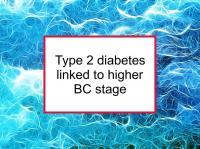Even normal weight women with diabetes have an increased risk of breast cancer. Type 1 diabetes does not appear to be associated with breast cancer risk. Now a new study has reported that women with diabetes tend to be diagnosed with later stages of breast cancer than non-diabetic women.
Type 2 diabetes and breast cancer
Diabetes appears to increase breast cancer risk primarily through insulin-dependent pathways. High levels of circulating insulin (hyperinsulinemia) promotes breast cancer both indirectly and directly by stimulating growth. The production and metabolism of insulin-like growth factors are also disturbed in diabetics, and may contribute to increased cancer risk and progression.
There is some evidence that high circulating glucose promotes breast cancer even without insulin resistance. High blood sugar has been shown to increase breast cancer risk even in lean women without diabetes.
A number of studies have reported that diabetes is associated with shortened survival among breast cancer patients. High fasting insulin may be an independent risk factor for poor outcomes in women with breast cancer. High levels of fasting glucose at diagnosis have also been found to be associated with increased risk of recurrence compared to normal levels.
Generally speaking, diabetics who use metformin have better outcomes than those who do not. In addition to increasing insulin sensitivity, metformin has been shown to reduce cell proliferation and induce more favorable responses to chemotherapy.
Metformin has been shown to improve survival of diabetic women with HER2 overexpressing (HER2+) breast cancer and suppress metastasis of triple negative (ER-/PR-/HER2-) breast cancer cells. On the other hand, there is some evidence that use of Lantus (insulin glargine) or sulfonylurea derivatives such as Glipizide could reduce breast cancer-specific survival, although these findings are controversial.
Latest research links diabetes to more advanced stages
The study referenced at the beginning of this news article was designed to investigate the influence of type 2 diabetes on breast cancer stage at diagnosis. To conduct the study, the authors used population-based databases to determine the stage (I, II, III, or IV) among 38,407 women newly diagnosed with invasive breast cancer during the period 2007 to 2012 in Ontario, Canada. The women ranged in age from 20 to 102. A total of 6,115 (15.9 %) of the women had diabetes at diagnosis. Results were adjusted for screening mammogram use and breast cancer risk factors.
Diabetic women were significantly more likely to have advanced-stage breast cancer at diagnosis than non-diabetic women. Having diabetes was associated with a 14% increased risk of Stage II, 21% increased risk of Stage III, and 16% increased risk of Stage IV compared to Stage I breast cancer. Diabetic women had 16% higher risks of both lymph node metastases and tumors with size greater than 2 cm.
The authors conclude that diabetes is associated with more advanced-stage breast cancer, suggesting that diabetes may predispose women more aggressive disease, which may in turn contribute to their higher cancer mortality.
Please see our article on type 2 diabetes for more information.
